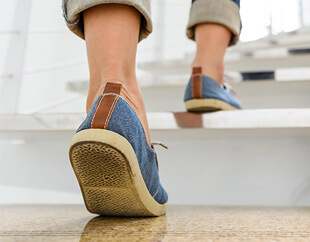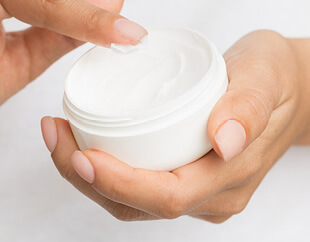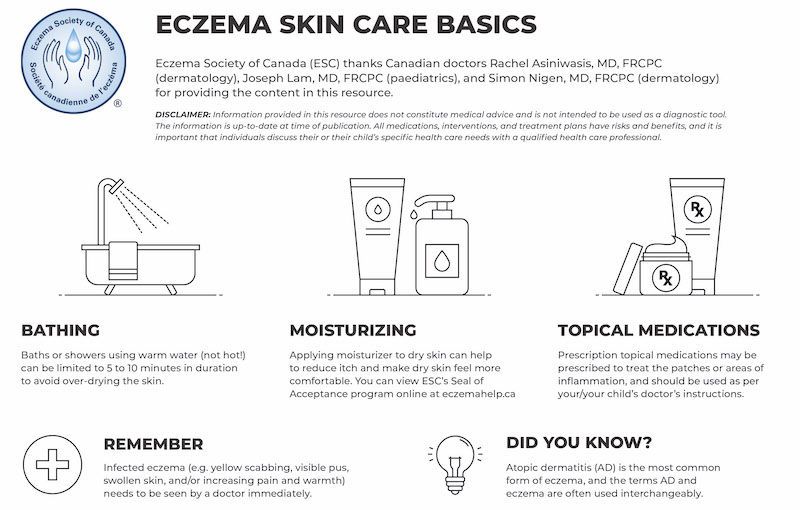When we think about itch, it is typically associated with atopic dermatitis (AD), commonly known as eczema. It can feel like thousands of bugs biting us at the same time and the need to scratch can truly feel out of our control. In many ways, it can be the hardest part of living with AD, yet sometimes, the most misunderstood.
To help with this uncomfortable, disruptive, and frustrating symptom, ESC created tips on how to reduce scratching and calm the itch of AD. With help from dermatologist Rachel Asiniwasis, MD, FRCPC, and registered psychologist Shawn Reynolds, PhD, this content is a follow-up to our Itch in Atopic Dermatitis Survey Report that explores the impact of itch on quality of life and daily activities.
ESC spoke with Dr. Asiniwasis about itch and AD, who shared: “As doctors, our understanding of itch is advancing. We are continuing to learn more and more about this challenging symptom and are unlocking new ways to treat it. In recent years, research pointed to the inflammatory process as part of what drives itch in AD. More recently, researchers are better understanding the relationship between the immune system and nerve cells and how they communicate with each other, and how that connection contributes to itch.”
It is an exciting time as science is evolving and we are beginning to find new ways to understand and manage this troublesome symptom. In the meantime, people with AD are itchy! Check out the tips from our experts below to help you and your family cope with this challenging symptom.
The itch associated with atopic dermatitis (AD) can be uncomfortable, disruptive, and frustrating. It can also be complex. Our understanding of the science of itch is evolving, and researchers are exploring new ways to treat this challenging symptom. If you or your child are having difficulties with itch, be sure to speak with a qualified healthcare provider, like a dermatologist, to ensure the condition is being managed appropriately.

Keep nails smooth and trimmed short to reduce damage from scratching.

Try to reduce stress as much as possible. Find activities you enjoy and help you to relax, such as walking, meditation, cooking, or exercise.

Try a cool compress or take a cool bath or shower.

The use of moisturizer may help to relieve dry skin and itch.
Be gentle with yourself: Scratching is a tricky habit to break! As a fellow AD sufferer, I know the reasons I am not supposed to scratch – mainly, that it just makes my condition worse – but I still can’t stop myself from doing it anyway!
Be gentle with your loved one: If you are a parent or a loved one of someone with AD, you probably know that telling them “Just stop scratching!” doesn’t work. They would stop if they could! AD sufferers often find it very hard to control their urge to scratch, as their skin can be extremely itchy. Instead, offering a distraction, such as spending time with them, playing a game, or doing some kind of activity together can be a good alternative. Be patient with them and know that they want to stop as much as you want them to stop.
Practice awareness of your scratching habits: Try being aware of the places or times of day when you are mostly likely to scratch, like sitting in front of the TV, or when falling asleep.
Try thinking strategies: Focus on something else instead of the sensation of itch, do some deep breathing, or recognize the sensation of itch and see if you can acknowledge the sensation without scratching the skin.
Try finding an enjoyable and distracting activity such as reading, watching television, or playing a game.
It can be helpful to remember that well-managed flares can result in less itchy skin. If you or your child are having difficulties with itch, be sure to speak with a qualified healthcare provider, like a dermatologist, to ensure the condition is being managed appropriately.
Learn more about itch and eczema.
ESC asked registered psychologist and fellow eczema sufferer Dr. Shawn Reynolds to share his advice on coping with the stress and sometimes overwhelming feelings that accompany eczema symptoms.
Living with eczema can be very stressful, challenging, and burdensome. When people have stress from their eczema, they often seek help from their dermatologist or family doctor. The doctor can focus on medical strategies to treat the eczema. But often, there are other difficulties that go beyond the need for medical help.
Some of the emotional effects of eczema can include:
Together, these challenges can leave people feeling stressed, anxious, and/or depressed. Working with a psychologist or mental health professional who understands these problems can help manage these feelings. There are resources in every province that can connect you with someone who can help, and your primary care provider can also help to find services in your area.
There is a connection between stress and many medical conditions. It is important to be aware of this connection, and to take care of yourself when you are feeling extra stress. Stress can indeed flare eczema but living with a chronic condition is itself stressful! Activities like relaxation, exercise, talking to friends, and simply doing something fun or enjoyable can all help to relieve stress.
Adults and children with eczema often have experiences that can make them feel bad. These can include:
Sleep problems: When people wake up at night due to itching, it can be very frustrating. They often lose out on a good night’s sleep. People who don’t sleep well are often irritable the next day, at risk for headaches, and not as good at solving everyday problems. When children with eczema don’t sleep, often no one in the house sleeps. This can impact the emotional well-being of the parents and siblings, as well as the child with eczema.
Itch and pain management problems: Eczema can be very itchy and can even be painful. This can be on the person’s mind all the time. People in constant itch and pain have a hard time getting their daily activities and work done, as it is easy to be distracted by the pain. Sometimes they are more emotional because they get frustrated and tired from their disease.
Self-confidence problems: Sometimes people feel less self-control because of their eczema (like not being able to stop scratching). Some even feel less attractive because of changes in their skin.
It is very hard to avoid scratching when the urge comes, and this can make a person feel out of control. The good news is there are steps to help manage itch. Treating the eczema appropriately to improve flares will reduce the itch. Cool packs or taking a cool shower, applying moisturizer when the skin is dry and itchy, and distraction may help. Preventative care like moisturizing daily can help to reduce itch too. As well, enjoying a fun activity, deep breathing, or a relaxation technique may also be helpful.
For people with eczema, it’s common to hit rough patches in life – whether due to eczema or the outside world. There is hope and there is help. To learn more about how to manage eczema or to speak with a support volunteer who can relate to your experiences, contact us.
Learn about bathing, moisturizing, and eczema management, as well as common triggers and techniques to cope with itch.

Learn about the different types of eczema, tips for managing flares, and more.